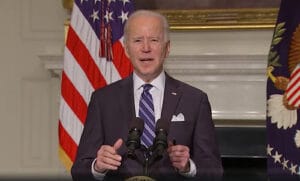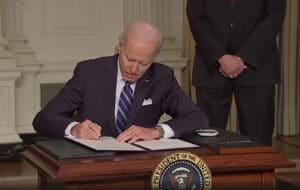
President Joe Biden reiterated his plan to accelerate the nation’s shift toward cleaner energy and transportation, specifically electric vehicles, and a carbon-free future while using that move to create 1 million new auto jobs.
“Today is climate day at the White House,” he said as he began his remarks, “which to me means it’s jobs day at the White House.”
Biden said in concert with the order he signed Monday to mandate purchases made by the federal government must be for U.S.-made products, the government will begin the conversion of the federal government’s fleet of vehicles to battery-electric vehicles.
(Biden “Buy American” pledge potentially good news for U.S. EV makers.)

“We’re going to harness the purchasing power of the federal government to buy clean, zero-emission vehicles that are made and sourced by union workers right here in America,” he said, adding that to the earlier actions will result in 1 million new jobs for the U.S. auto industry.
He was also clear that the push by the Trump administration to roll back emissions and fuel economy standards – saying Trump “picked big oil over American workers – was unacceptable and that he planned to set “new and ambitious standards that our workers are ready to meet.”
During his recent series of executive orders, the president has consistently said he had faith in the ingenuity, creativity and doggedness of U.S. workers, and he stuck to that message today, saying that American workers, particularly union workers, were ready to lead the world in battling climate change by producing cleaner and environmentally friendly products, including vehicles.
That confidence is very directly tied to his push to grow electric vehicle acceptance and sales not only though federal government’s “purchasing power,” but also in addressing some of the public’s concerns about EVs.
(UAW, AAM back Biden’s “Buy American” mandate.)
“We see these workers building new buildings and installing 500,000 new electric vehicle charging stations across the country as we modernize our highway systems and adapt to the changes that have already taken place,” he said.
He noted that car buyers are already beginning to make the shift toward electric vehicles, taking advantage of federal, state and local rebates and incentives. However, he didn’t address the possibility of reinstating the $7,500 federal tax credit for people who buy electric vehicles built by General Motors or Tesla.
Those two automakers have already outsold their ceiling of 200,000 battery-electric cars, trucks and SUVs that were eligible for the credit. Once an automaker hits that number, the credit gets halved to $3,750, then halved again to $1,850 and then disappears entirely within a year.
For Tesla, the loss of the federal credit has been partially offset by CEO Elon Musk’s move to lower the prices of vehicles. However, the popularity of the California-based EV maker hasn’t been impacted, selling a record number of vehicles in 2020, nearly hitting the 500,000 mark globally.
(Biden plan to promote EVs threatens to deplete Federal Highway Fund without major changes.)







